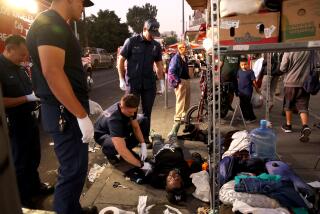Drive to Rid Blythe Street of Drugs Intensifies
For at least six years, Blythe Street in Van Nuys has been notorious as a hotbed of drug trafficking, according to Los Angeles police.
And for just about as many years, police have been seeking new ways to battle the problem there and in other drug-ridden neighborhoods in the San Fernando Valley.
This week, an unspecified number of uniformed officers in marked police cars are being added to undercover units in what authorities are calling an attempt to drive drug dealers out of the community.
The stepped-up patrols are an outgrowth of a highly publicized task force that swept through these areas in late March for a week, stopping 967 people and netting 70 arrests in what police said was an attempt to scare drug pushers off the street.
Month in Each Section
The new effort will see patrols in all five Valley divisions spending at least a month in each of the drug-plagued neighborhoods, according to Cmdr. Ken Hickman, who organizes narcotics enforcement.
“None of this says I’m going to cure a dope user or dope seller,” Hickman said. “I just want to return those areas that they’ve dominated to the community.
“When you can drive down Blythe or Orion Street at any time of day or night and not see evidence of street narcotics sales, then we will have done our job,” he said.
Residents of Blythe Street are viewing the additional police patrols with mixed feelings.
“I often walk on these streets, and I feel more protected with the care the police are taking,” 30-year-old Consuelo Morales said in Spanish. Like many of the residents, she is a native of Mexico and a parent.
“There is a lot of drug trafficking here; it’s very dangerous, but the police are passing by more frequently, and it’s a little calmer,” said Nicholas Madera, 22, a factory worker and the father of a 2-year-old daughter.
But longtime resident Mario Cardenas, 37, said he still feels nervous as he walks up the street with his 18-month-old son, Mario Jr.
“There are a lot of police, and they’ve controlled it some, but you still see people selling drugs,” Cardenas said. “I’ve never seen anything like it. I’ve seen them sell drugs almost right in front of the police.” He said he thinks increased undercover police officers could alleviate the problem.
“Police shouldn’t announce that they’re coming and make a big show of it. They should be undercover and get them while they’re selling,” he said.
Cooperative Effort
Ramiro Cuevas, 48, who has lived on Blythe Street for 11 years, said he and his neighbors took matters into their own hands recently.
Cuevas said he and his neighbors would watch drug dealers hide behind a tree outside their apartment building and conduct their transactions.
Last month, residents burned the tree down, Cuevas said, gesturing to a blackened two-foot stump.
“Two or three used to stand here and hide behind this tree. Now that we’ve burned it down, we ran them out of here, and they’ve gone back down the block,” Cuevas said.
Police estimate that there are 20 to 25 people who regularly sell cocaine, marijuana and heroin on Blythe Street, mostly to passing motorists.
“As soon as you put a drug dealer in jail, two more jump up and take his place,” Hickman said. “They just wait for a space on the sidewalk so they can come out and sell.”
Most are not big-time dope dealers, police said.
“Most of these people are barely scraping by. They sell quantities of $10 to $30,” Hickman said. But police and residents point to bigger crimes associated with drug dealing, such as the frequent shootings that plague the neighborhood.
Josephina Cabrales, a 12-year resident of Blythe Street, remembers when the area was a safe place to live.
Looking Back
“When I came to this neighborhood, it was nice and calm. Now it’s a tremendous disaster, and it makes me very sad,” Cabrales, 60, said in Spanish.
“The police come by frequently, and I feel happy that they have more interest in combating crime, but the minute the police leave, the kids are selling drugs again,” she said.
She said she has heard vendors yell out, offering cocaine to any who will buy.
“They do it plainly, as if they were selling hot bread,” she said.
On nights when noise and gunshots keep her awake, she calls the police, she said, but is frightened to give her name and address, fearing retribution.
Cabrales is convinced that “if the police wanted to, they could end this situation” with more undercover officers.
She said she carefully avoids walking by the drug sellers, and wishes that the neighbors would “unite and protest” to bring an end to the drug trafficking.
“There are safer neighborhoods, but I don’t have the money,” she said. “I have always been poor, and anything I can afford will be the same way.”
More to Read
Sign up for Essential California
The most important California stories and recommendations in your inbox every morning.
You may occasionally receive promotional content from the Los Angeles Times.










